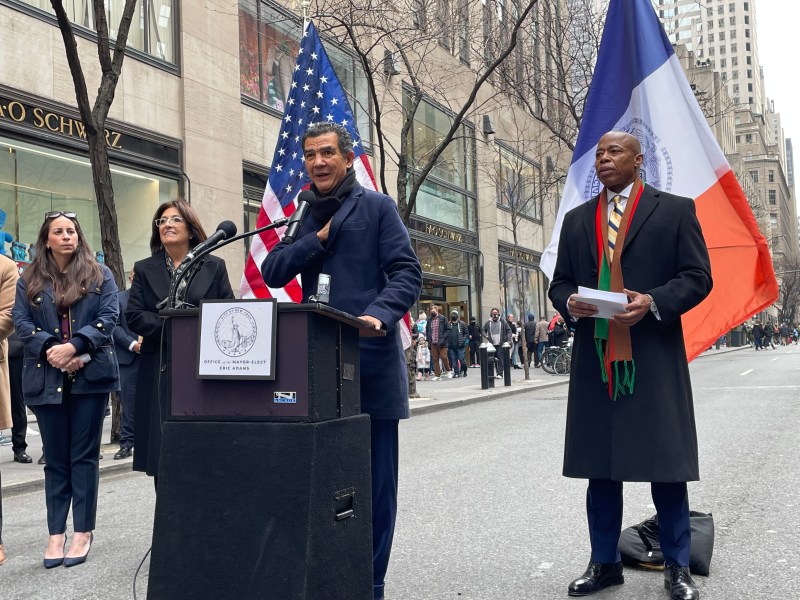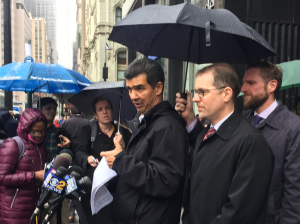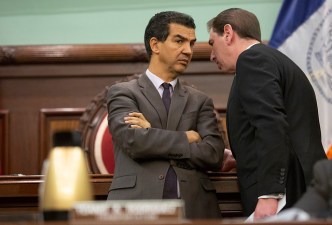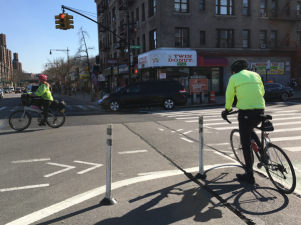Incoming DOT Commissioner Supports Residential Parking Permits


Incoming Transportation Commissioner Ydanis Rodriguez threw car owners a bone on Monday by reiterating his support for a citywide residential parking permit program — even though the agency he will take over next month has staunchly opposed it.
On WNYC’s Brian Lehrer Show, Rodriguez touted his own City Council bill that called for the DOT to set up a residency-based parking permit program, adding, “In my new role as commissioner, I will work with our deputy mayors, with our new mayor Eric Adams, and we will look at this bill.”
Rodriguez’s proposal has languished in the legislative chamber since it was introduced in 2018, and currently only has five sponsors — and a new version would need to be passed if it is not voted on by Dec. 31. But other returning Council members, including Manhattan lawmakers Keith Powers and Diana Ayala, and Francisca Moya of Queens have bills to create residential parking permits in their areas.
If Rodriguez truly pushes the idea inside his Department of Transportation, it will represent a significant change in policy. In 2018, the agency’s First Deputy Commissioner Margaret Forgione testified against the residential parking permit bills on the table at the time, citing potential complications in the pricing and number of permits.
Forgione also agreed that residential permits are counter to the city’s equity goals because people who drive from a transit desert to a dense, well-to-do neighborhood full of transit options, such as Manhattan, would be locked out of the rich neighborhood so that residents there could store their cars.
She also pointed out that many residents wrongly believe that neighborhood parking permits will suddenly make it easier for them to park.
“Previous observations by DOT have indicated that there may be fewer outsider vehicles in New York City neighborhoods than people may perceive, with many actually belonging to local residents,” she testified. In fact, she said, there are simply too many cars in New York City already, so such a program would be a bad idea, given that some studies show that residential parking permits encourage people to buy cars.
“In New York City, on-street parking scarcity is mainly driven by the large number of resident-owned vehicles compared to the number of spaces available,” she said.
There are other problems, of course, because having a permit system — by definition — suggests that there will be a cap in the number of permits — and whenever demand outstrips supply, the price of an item is supposed to rise.
“If the price is significant, we would have to consider various claims for hardship or other exemptions as well as the question of whether an applicant’s possession of off-street parking should be a factor in whether they receive a permit,” Forgione added, outlining the challenges of setting up a system. “Likewise, managing any system of visitor passes would be logistically complicated.”
Rodriguez may be an outlier anyway. In interviews with Streetsblog earlier this year, incoming Council members from Brooklyn, the Bronx and Manhattan didn’t list parking permits as a key transportation issue, and only one Queens representative, Lynn Schulman, mentioned bringing neighborhood parking permits to her eastern Queens district.
Rodriguez said that he’d seen a successful implementation of a resident parking permit idea in Albany. But there’s still questions about whether the system, which charges only $20 and gives out just 3,500 permits per year, would work in New York City the same way the capital’s program works against visiting hordes of lobbyists, big city reporters and out-of-town legislators. Manhattan Borough President and incoming Council Member Gale Brewer published a report in 2019 analyzing the results of parking permit programs in cities internationally. That report deemed the idea “a mixed bag” after looking at the results in Stockholm, San Francisco, London and Boston, in part because of cities giving out more permits than there were permitted parking spots. The report also suggested that the price for a permit might have to be high in order to actually provide a fair market price for reserved curb access in the denser areas of the city.
Advocates say that the price issue is the true sticking point in building out a parking permit program, since the time and energy spent on the idea would have to be perfectly calibrated to the price, or a permit program wouldn’t work for anyone involved.
“You could do a lot of work on [permits] and do a lot of politics and administrative stuff to get these out, but it doesn’t do that much for a driver, and it really doesn’t do much for sustainable transportation unless you’re really going to charge a lot for it,” said Bike New York Director of Advocacy Jon Orcutt.
Rodriguez’s support for residential car storage permits comes after he has made many promising overtures to pedestrians and cyclists, first promising to upgraded half of the city’s flimsiest protected bike lanes, and then vowing more general safety improvements after last week’s fatal crash that claimed the life of delivery Taurino Morales, 37, and pedestrian, Delfino Maceda, 46.


